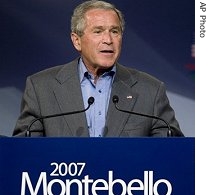2007年VOA标准英语-Bush Says Iraqis Will Decide Their Own Future(在线收听)
White House
21 August 2007
U.S. President George Bush says, despite Washington's frustration with the slow pace of political progress in Iraq, it is up to Iraqis to decide the future of their government. VOA White House Correspondent Scott Stearns reports, the president is responding to an influential U.S. Senator who says Iraq's parliament should dismiss Prime Minister Nouri al-Maliki.
The chairman of the U.S. Senate Armed Services Committee says Mr. Maliki's government cannot achieve a political settlement, because it is too bound by its own sectarian prejudices.
Michigan Senator Carl Levin wants Iraq's parliament to remove Mr. Maliki's government, because he says it has "totally and utterly failed."
Speaking at a news conference, President Bush replied that it is up to the Iraqi people to determine the future of their government, not American politicians.
 |
| President Bush gestures as he responds to a question during the closing news conference at the North American Leaders Summit in Montebello, 21 Aug 2007 |
"The Iraqi people made a great step toward reconciliation when they passed the most modern constitution in the Middle East," said Mr. Bush. "And now their government has got to perform. And I think there is a certain level of frustration with the leadership."
Responding to reporters' questions in Canada following a meeting with the leaders of Canada and Mexico, Mr. Bush said if Iraq's government does not respond to the demands of the people, the people will replace it.
Senator Levin, a Democrat, visited Iraq with his committee's ranking Republican, Virginia Senator John Warner. In a written statement on Monday, both men said they told Iraqi leaders of the deep impatience of the American people and that time has run out on reaching a political consensus in Baghdad
The lack of political progress in Iraq has overshadowed some recent military accomplishments. Senators Levin and Warner say U.S. reinforcements are having measurable results that are giving Iraqi leaders the opportunity to make political compromises. But the Senators say they are not optimistic about prospects for those compromises.
In talks with American and Iraqi diplomatic and military officials, the senators say they witnessed a "great deal of apprehension regarding the capabilities of the current Iraqi government to shed its sectarian biases and act in a unifying manner."
Demonstrating political progress in Iraq is crucial to the president's report to Congress next month. Ambassador Ryan Crocker and top military commander General David Petraeus will report on the impact of the president's January decision to send more troops to Iraq.